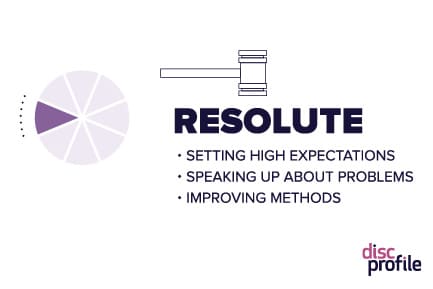People whose DiSC® profile shows a DC style display a blend of the D style’s dominance and the C style’s conscientiousness. They are tough-minded, determined folks who tend to excel at critical thinking. They are naturally skeptical, at times cynical. DC types value personal autonomy and feeling in control. They work hard to be experts in their area and prize competence in themselves in others.
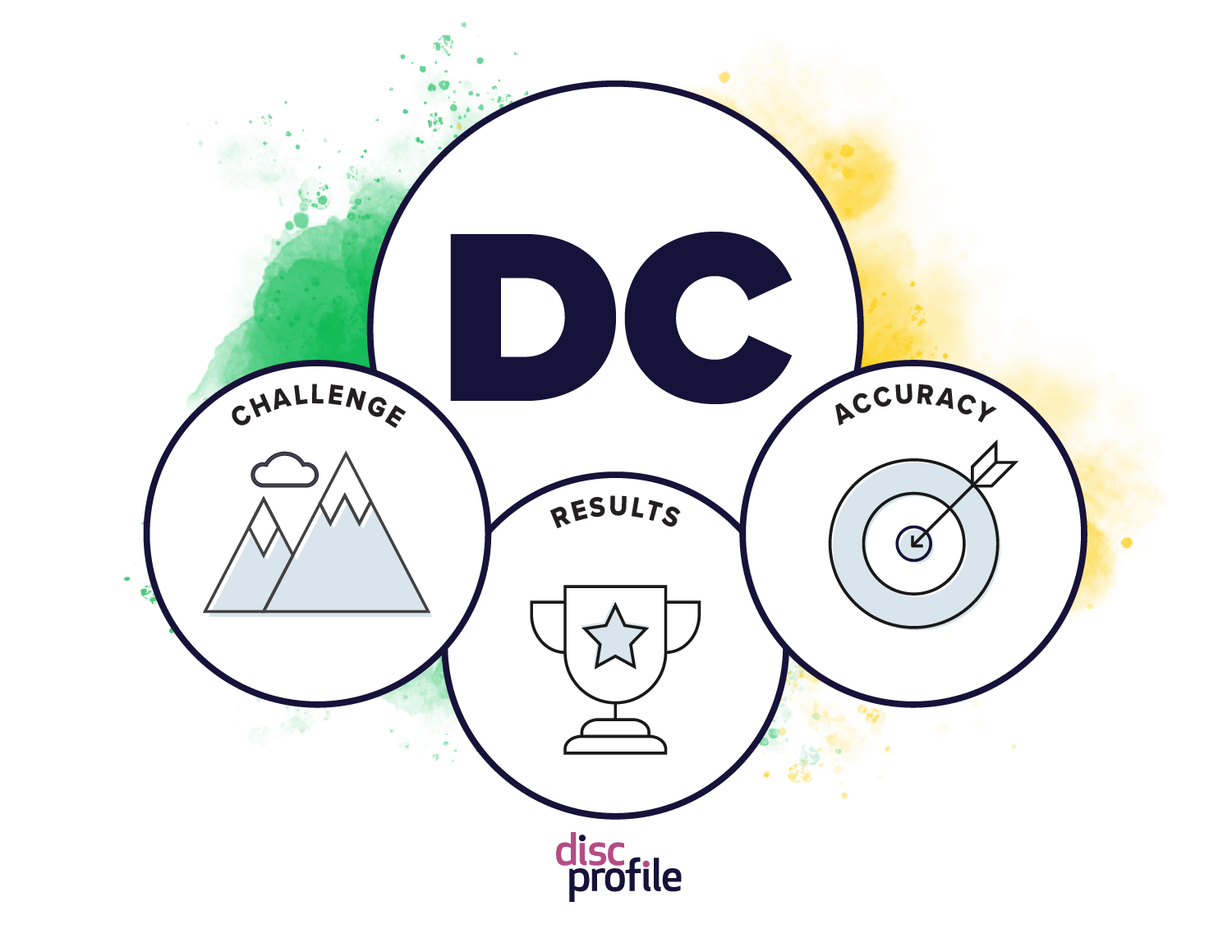
The DiSC DC personality type at a glance
- Traits: Drive for perfection, takes initiative, diligent, strong-willed, determined, creative, blunt, critical, aloof, cool, focused, tough-minded, determined
- Driven by: Independence, personal accomplishment
- Anxieties: Failure to achieve their own standards
- Influences others by: High standards, determination
- In tense situations: Sticks up for their own rights, digs in heels even further
How strongly this matches your own DC style will depend on how close your dot is to the edge of the DiSC circle. The closer your dot is to the center, the more likely it is that you’ll exhibit some of these traits less frequently.
DiSC style blends: DC
Everything DiSC® assessments measure eight scales: D (Dominance), Di/iD, i (influence), iS/Si, S (Steadiness), SC/CS, C (Conscientiousness), and CD/DC. People with the DC style score highest on the DC/CD scale. Further, their responses show tendencies slightly more in line with the D style than the C style. D-style folks are direct and strong-willed. People with C styles are composed and analytical. DC styles are a blend of the two.
Everyone is a mixture of all DiSC styles, but most people tend toward one or two. All DiSC styles are equally valuable.
What is the opposite DiSC style of DC?
You can visualize the great variety in personality types when you look at which styles are opposite each other on the DiSC circumplex. For the DC style, the personality type across the circle is the Si style. People with DC styles likely score lower on Si-scale measurements like empathy and seeing the best in others. DC-style folks may absolutely be empathetic or trusting sometimes, but it will likely take them more energy than behaviors that align with their default settings.
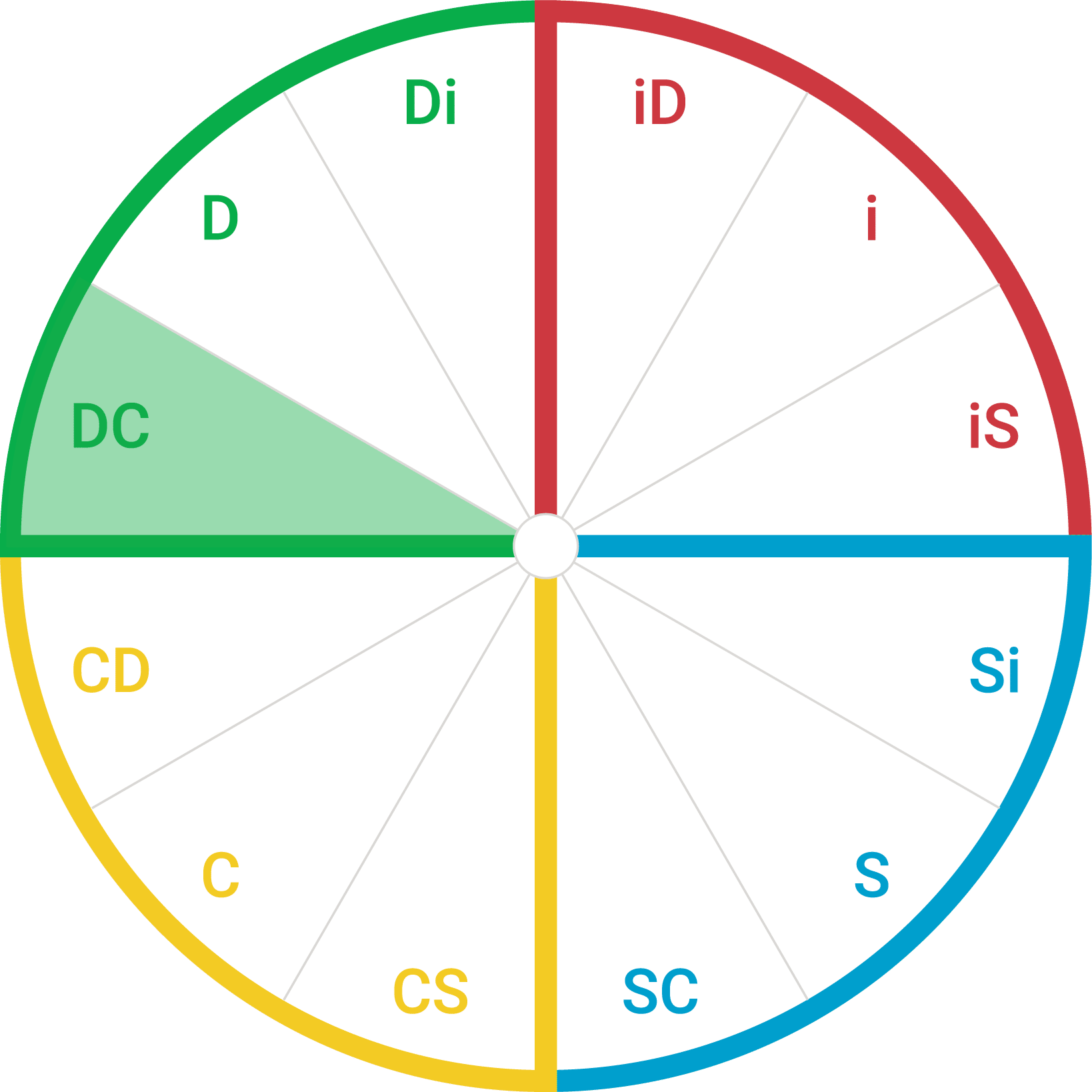
- Si-style people tend to be accommodating, while DC-style folks are stubborn.
- The Si-type personality is motivated by collaboration; the DC style often prefers to work independently.
- Si styles are naturally accepting, while DC styles are naturally skeptical.
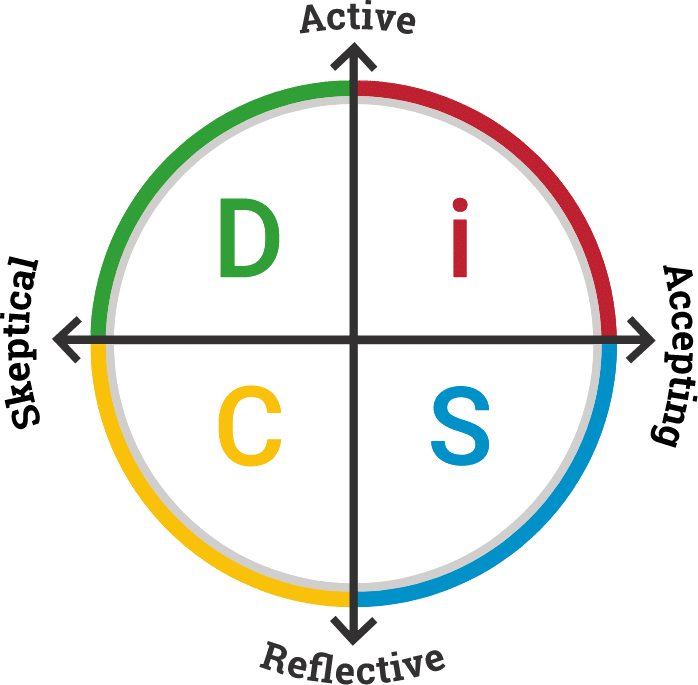
What motivates the DC style?
People with DiSC DC styles are motivated by challenge, results, and accuracy.
Challenge
- want to make sure the best possible methods are used
- are questioning and skeptical of other people’s ideas
- relish an opportunity to prove themselves
Results
- direct and straightforward
- focused on the bottom line
- driven to overcome obstacles
Accuracy
- want to control the quality of their work
- focus on separating emotions from facts
- have an objective, analytical approach
What are the DC style’s driving assumptions?
We all have unconscious beliefs that drive our behavior. For the most part, we’re not aware of these driving assumptions. Perhaps we wouldn’t claim or defend them in the light of day, yet they influence our decisions.
For the DC style, thoughts like these may drive their behavior and choices:
- I’m valuable if I’m competent.
- I should always be self-sufficient.
- If I’m not in control, I open myself up to disaster.
- I should have complete mastery in all areas of my life that are under my responsibility.
- It is undignified to show intimate emotions.
Every person is different, so even within DC styles, some of these statements will resonate more than others.
Driving assumptions can lead to both destructive and productive behaviors. For example, the values above can lead DC-style people to have rigid beliefs about how people should behave, and to judge others when they don’t meet these standards. But they also motivate DC-style folks to keep digging for answers or understanding, even when those answers don’t come quickly or easily.
How does the DC style handle stress?
Different things feel stressful to people of different personality types. For example, many people are stressed by having to give blunt feedback, but DC styles find this kind of candor natural.
What does stress out a DC-type personality:
- lacking control
- feeling vulnerable to an untrustworthy world
- sensing any possibility they will be seen as incompetent
- experiencing failure
- having to rely on other people
- following an inefficient process
- realizing others don’t share their dedication to high standards
Under stress, DC styles tend to:
- be easily irritated and impatient with others
- become judgmental
- be quite blunt
- look for ways to gain or maintain control
- have a real aversion to showing vulnerability
How can I work well with DC-style people?
People with DiSC DC personality types bring a lot to their workplaces. They are tenacious and driven, able to stick with something until they get it right, whereas most people would look for an easier way out.
Tips for working with DC personality types:
- Focus on facts and minimize “pep talk.”
- Give them the bottom line.
- Say what you mean. They appreciate direct and honest communication.
- If you feel taken aback by something they say or the manner in which they say it, point it out and ask for clarification. They may not always be aware how their direct demeanor affects others.
- Demonstrate your competence and your commitment to high standards.
- Show how your ideas will get results.
- Be assertive. Don’t beat around the bush or try to avoid difficult discussions.
- Recognize the value of their drive to get things right.
The DC style and teamwork
DC-style teammates are generally determined and capable. They’re focused on getting things right and aren’t scared off by obstacles.
Strengths of DC-style teammates:
- self-starters
- direct communicators
- won’t accept ideas at face value
- hold themselves and others to high standards
- rigorous and reliable
- great at turning obstacles into opportunities
Challenges of DC-style teammates:
- communicating with tact
- keeping an open mind when teammates do things in a different way
- collaborating with people they see as less competent
- showing patience
- dealing with strong displays of emotion
Read more: Team building
What if there are many DC-style people on a team?
The mix of individual styles within a group creates a larger DiSC group culture. When a group displays a D culture (with many people of DC, D, and Di styles) it tends to be dynamic, driven, and innovative. We call this the “get it done” team.
Advantages of the DC group culture:
- gives straightforward feedback
- rewards critical thinkers
- embraces challenge
Drawbacks of the DC group culture:
- members may prefer working on their own to collaborating
- short on praise and positivity
- provides feedback without considering feelings
Read more: DiSC D group culture
Which careers are good for DiSC DC personalities?
This is a common question, but the truth is that people of any personality type can find success in any job field. It is misguided to base career decisions (or hiring decisions) on personality type alone.
Although your DiSC profile can’t tell you what career is best for you, it can help you clarify what you’re looking for in a job. Reviewing your DiSC profile can remind you what gives you energy and what drains it, and help you articulate your core motivators and stressors.
For example, people with DC styles tend to value opportunities to become experts in a subject area or field. They may look for environments that give them independence and the chance for personal accomplishment. DC-type people could explore jobs in engineering, medicine, technology, research, law, sound or lighting design, aviation, quality control, and many other fields that welcome their tenacity and drive toward mastery.
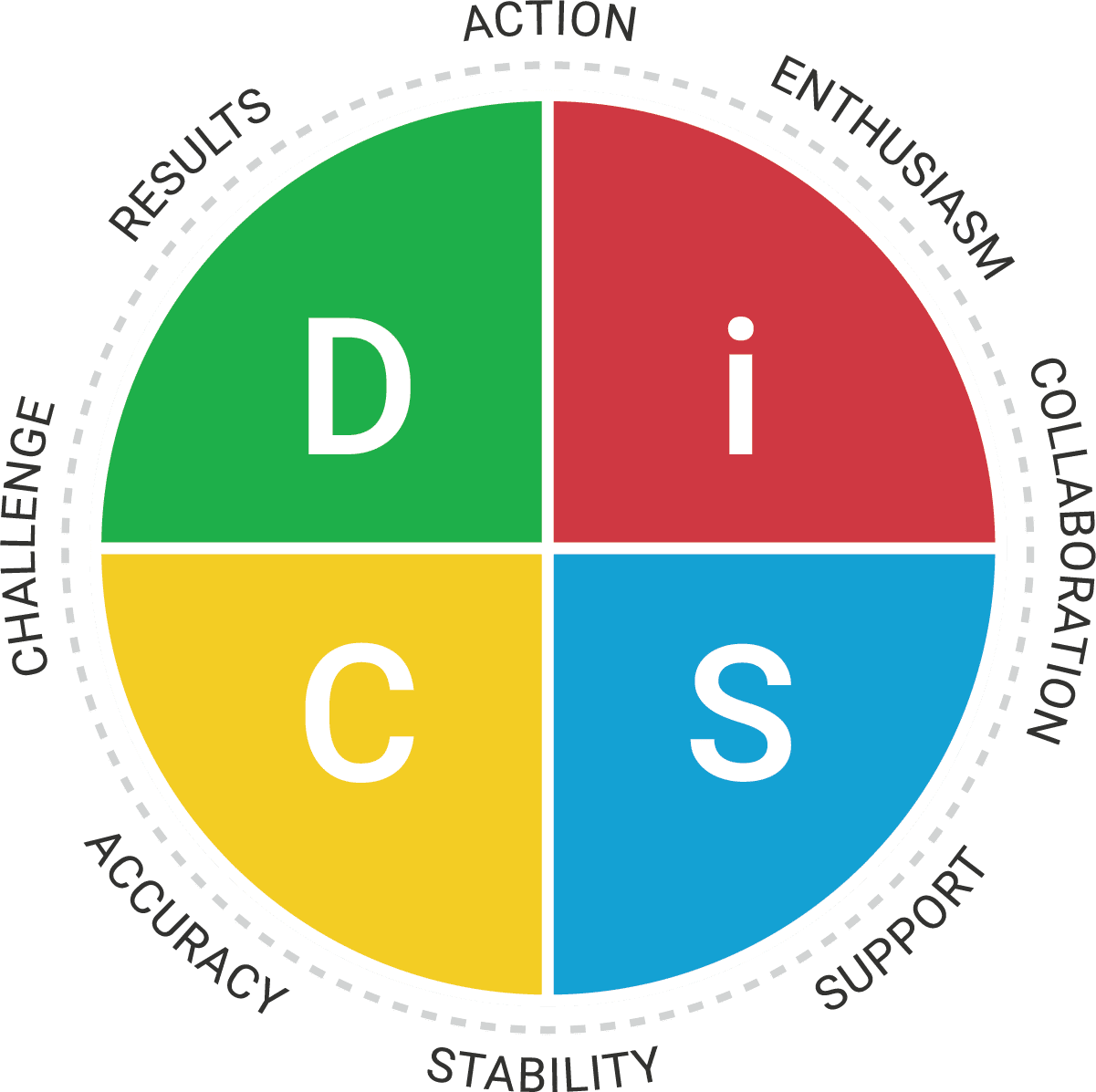
Do DC personality types make good leaders, managers, and salespeople?
Are DC types good leaders?
It’s easy to find great leaders of every DiSC style. No single DiSC style is best for leadership. Rather, effective leaders understand their natural strengths and challenges and learn to move between leadership styles to meet the situation at hand.
DC-style people are resolute leaders: focused on outcomes and willing to hold people accountable. They set high expectations, address issues head-on, and improve methods.
On 360-degree-type leadership assessments, DC-style leaders tend to rate highly in areas like speaking up about problems and insisting that things be efficient. They receive lower ratings on being approachable.
Read more: DC-type leaders
What are DC-style people like as managers?
Managers with the DiSC DC style:
- focus on results
- prioritize efficiency
- communicate clearly and directly
- respond best to people who can demonstrate their competency
DC-type managers probably enjoy:
- pushing their team to have high standards and meet them
- being looked to for their expertise and advice
- solving problems head-on
- helping their employees find better, more efficient ways of working
DC-style managers likely don’t enjoy:
- feeling like they have to be a cheerleader to boost morale
- spending a lot of time praising their team
- dealing with overly emotional people
- following inefficient systems

Read more: Management
Do DC-style people make good salespeople?
Each DiSC style has its natural strengths and challenges when it comes to sales. Someone’s DiSC style does not predict how successful they will be as a salesperson.
Salespeople with DC styles are confident and straightforward. They are likely very prepared for any meeting, and enjoy the opportunity to show customers that they know their stuff.
Other characteristics of DC salespeople:
- not easily flustered
- great problem-solvers
- make customers feel they’ve made a smart decision
The overriding priority for salespeople with DC personality types is competency.
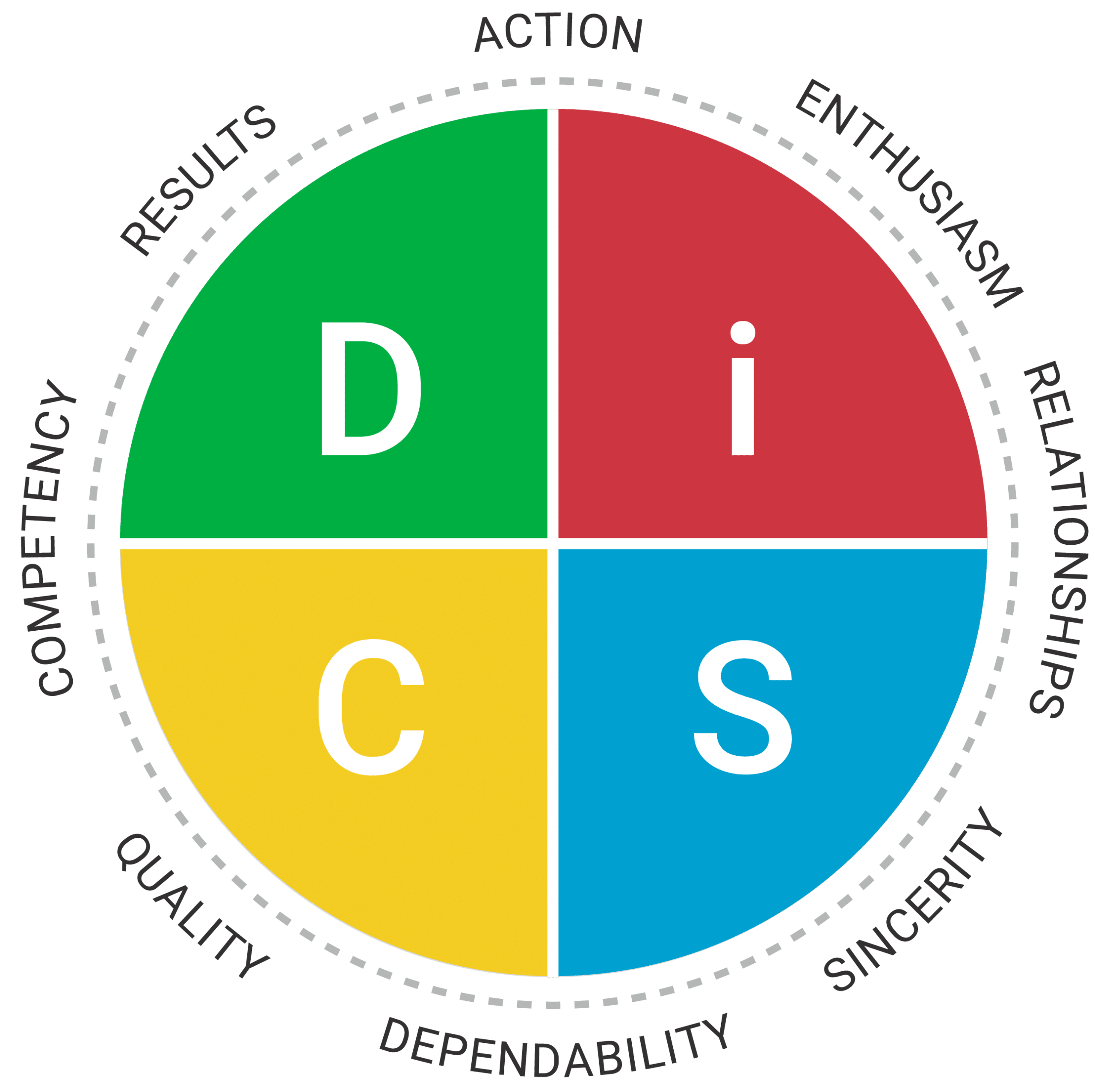
Read more: The 8 styles of salespeople
How does the DC personality type deal with conflict?
People with DC styles are often seeking justification in conflict situations. They have likely applied a great deal of critical thought to the issue at hand, and thus feel confident that they are in the right.
Conflict is a part of every workplace, and many studies show that some amount of conflict is actually healthy, when this conflict is productive, not destructive.
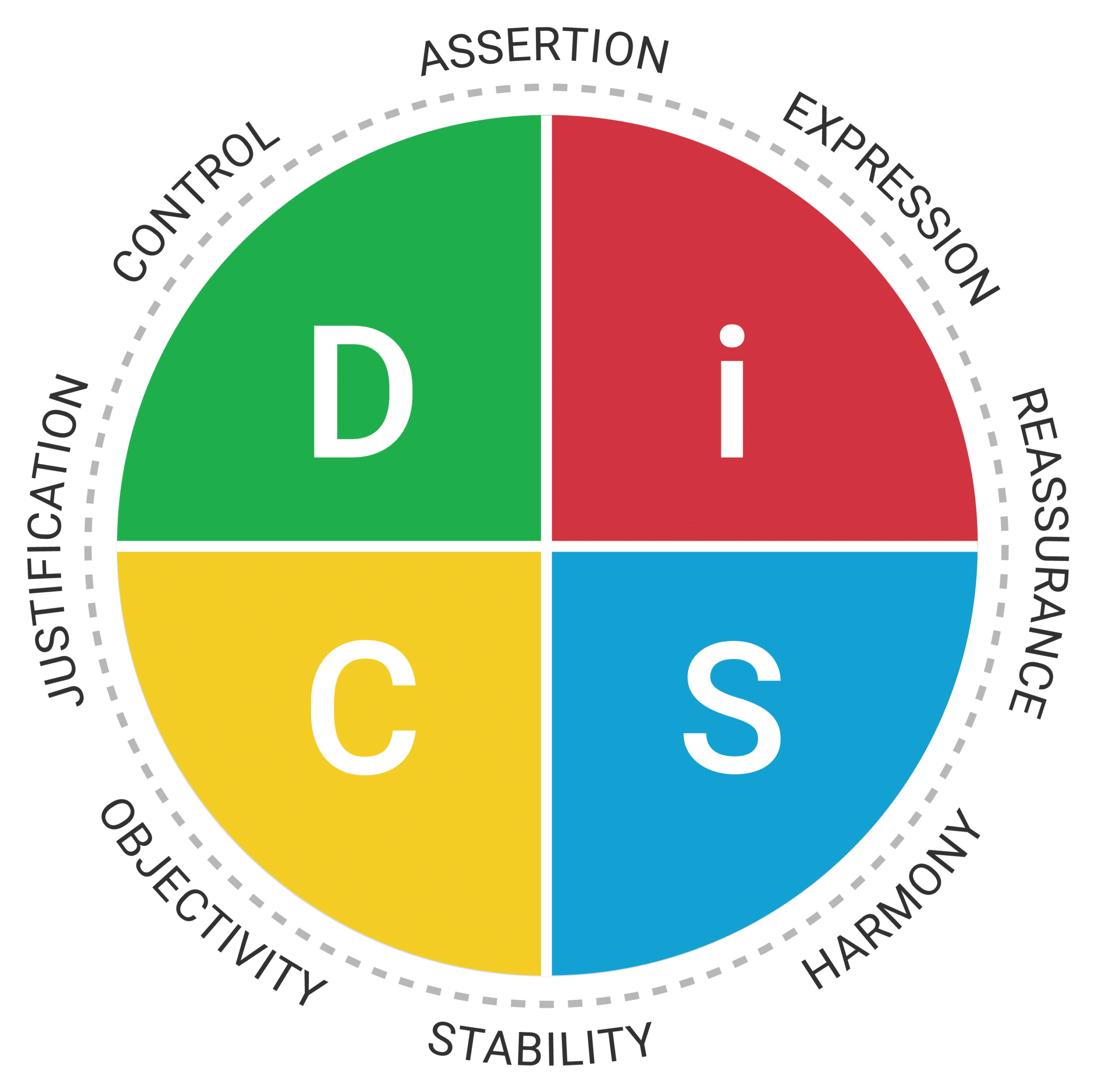
Tendencies of DC styles that are productive during conflict:
- are straightforward with opinions
- acknowledge tough issues
- focus on facts
- look to find the root cause of the problem
The same personality traits driving the above tendencies can also drive destructive tendencies during conflict, like:
- becoming overly critical
- digging their heels in
- not seeking to understand others’ perspectives
- insensitive and impatient
If you are in conflict with someone with a DC style, try these tips:
- Don’t take their bluntness personally.
- Lay out the facts of the problem.
- Resist the urge to give in merely for the sake of harmony.
- If you also have a DC or similar style, you may notice both of you digging your heels in. Articulate this to the other person, then take a step back and reevaluate.
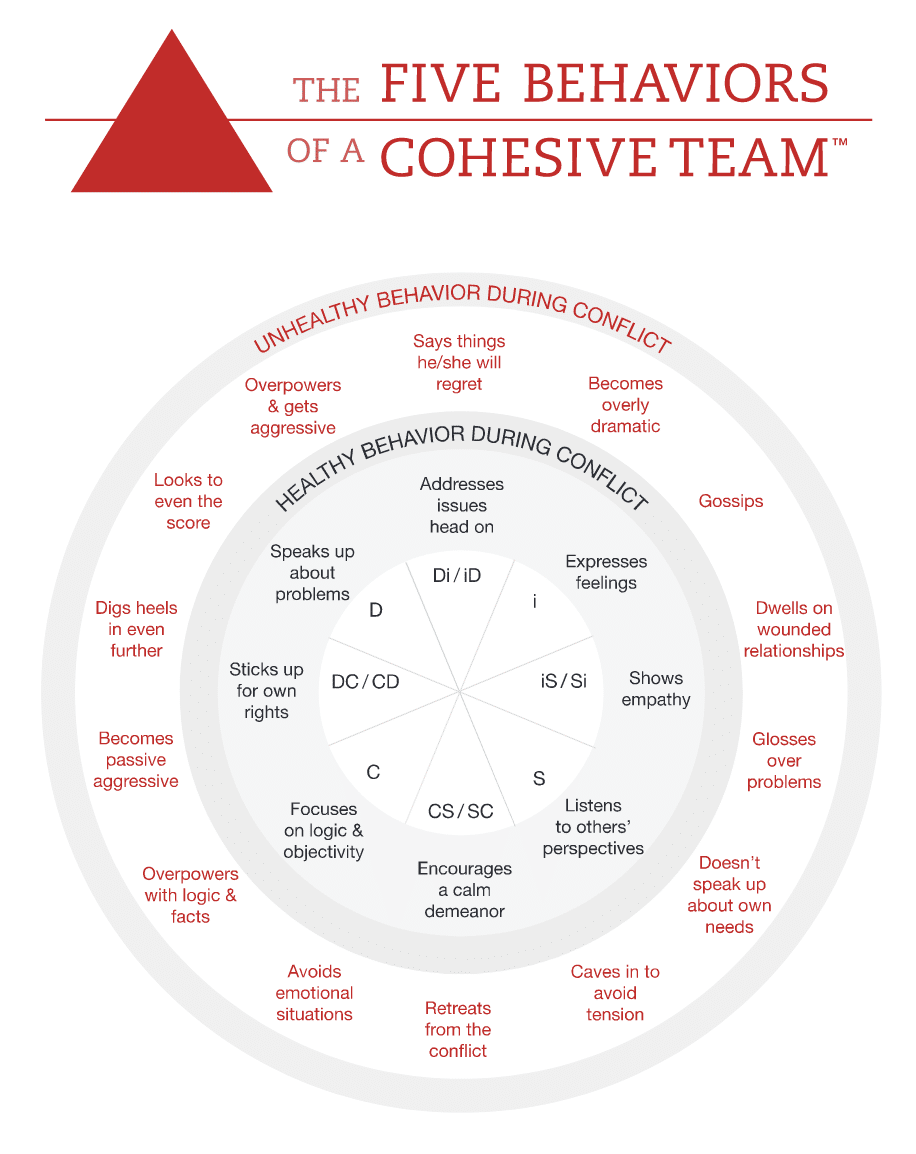
Is the DiSC DC style emotionally intelligent?
Emotional intelligence (EQ) is not a single trait, but rather a collection of skills that we can practice and develop throughout our lives. Each DiSC style has natural EQ strengths and challenges.
Of the eight EQ mindsets described in Everything DiSC Agile EQ, DC styles align most closely with the resolute mindset. This means DC-style people are likely to:
- stand by their beliefs
- speak up about problems
- push through resistance
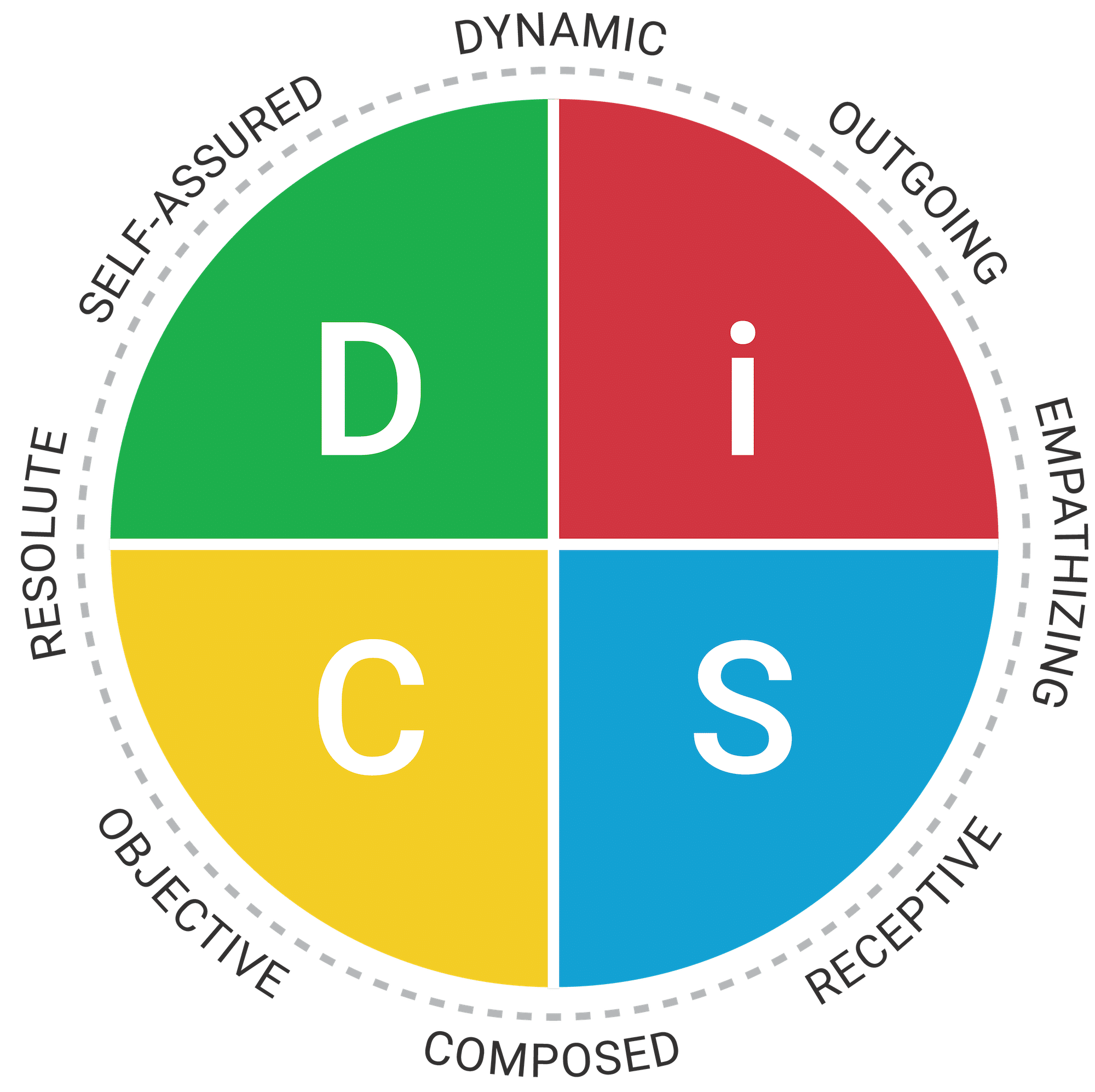
Read more: Emotional Intelligence (EQ)
What are some growth opportunities for DiSC DC styles?
Unlike many other personality assessments, Everything DiSC is developmental rather than just descriptive. If you take an Everything DiSC assessment, you’ll get both an understanding of your personality and an individualized path for personal development.
In general, DC-style people may benefit from working on:
- showing warmth
- communicating tactfully
- considering others’ perspectives
- practicing patience
- displaying vulnerability
- seeking to empathize with others
What is my DiSC style?
Do you have the DiSC DC personality type? If so, how does your unique personality differ from the typical DC type? Taking a DiSC assessment is the first step toward meeting many personal development goals. Not only will you understand your own behaviors more, but you’ll learn how to form better relationships at home and work. We recommend starting your DiSC journey with Everything DiSC Workplace.


